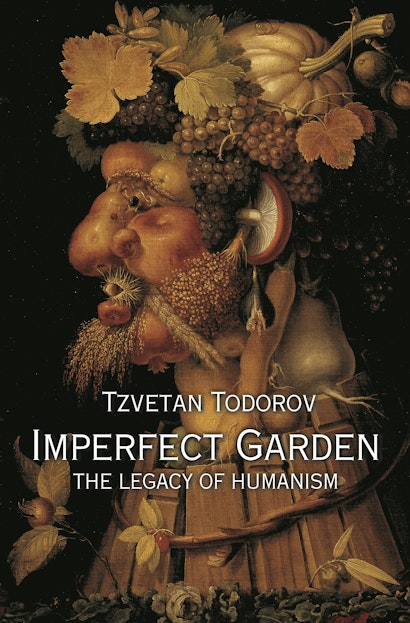Available in English for the first time, Imperfect Garden is both an approachable intellectual history and a bracing treatise on how we should understand and experience our lives. In it, one of France’s most prominent intellectuals explores the foundations, limits, and possibilities of humanist thinking. Through his critical but sympathetic excavation of humanism, Tzvetan Todorov seeks an answer to modernity’s fundamental challenge: how to maintain our hard-won liberty without paying too dearly in social ties, common values, and a coherent and responsible sense of self.
Todorov reads afresh the works of major humanists—primarily Montaigne, Rousseau, and Constant, but also Descartes, Montesquieu, and Toqueville. Each chapter considers humanism’s approach to one major theme of human existence: liberty, social life, love, self, morality, and expression. Discussing humanism in dialogue with other systems, Todorov finds a response to the predicament of modernity that is far more instructive than any offered by conservatism, scientific determinism, existential individualism, or humanism’s other contemporary competitors. Humanism suggests that we are members of an intelligent and sociable species who can act according to our will while connecting the well-being of other members with our own. It is through this understanding of free will, Todorov argues, that we can use humanism to rescue universality and reconcile human liberty with solidarity and personal integrity.
Placing the history of ideas at the service of a quest for moral and political wisdom, Todorov’s compelling and no doubt controversial rethinking of humanist ideas testifies to the enduring capacity of those ideas to meditate on—and, if we are fortunate, cultivate—the imperfect garden in which we live.
Tzvetan Todorov is Research Director of the Centre National de la Recherche Scientifique in Paris and the author of many books, including The Conquest of America, On Human Diversity, The Morals of History, Facing the Extreme, and The Fragility of Goodness (Princeton). He writes regularly for the New Republic, Salmagundi, and other publications.
"In Todorov's own terms, he has rejected both his own scientist past and the individualist alternative in order to join the humanists; and it is one of the great merits of this book, readably translated by Carol Casman, that it poses questions of choice and freedom, the rights and responsibilities of the individual at a moment when the French electorate ponders the meaning of its humanist traditions and the strength or weakness of its liberal democracy. The imperfect garden is a frustrating place to live, Todorov admits, but it shouldn't be abandoned to the snakes in the grass."—Douglas Smith, Irish Times
"How, Todorov asks, can thinkers from centuries ago speak to our concerns? In addressing this difficult, urgent, and quintessentially humanist question, Todorov's The Imperfect Garden exemplifies the rich legacy it so eloquently describes."—Carol E. Quillen, The American Scholar
"It is comforting to read an intelligent defence of liberal humanism. Like the authors he focuses on, Todorov is tolerant, understanding and wise."—English Showalter, The Observer
"It is comforting to read an intelligent defense of liberal humanism. Like the authors he focuses on, Todorov is tolerant, understanding and wise."—English Showalter, The Guardian
"Tzvetan Todorov's book on the humanist legacy is written very much in the spirit of Montaigne. . . . It offers a wide-ranging meditation on the open-endedness of human life, on the freedom and the sociability that are its only givens, and on the minimal ethic of autonomy and responsibility to others that they ought to inspire. Yet the book is by no means a hymn to man. Todorov harbors no illusions about the mix of good and bad that enters into the fabric of all that is human. . . . [He] . . . speaks throughout in his own voice, with rare breadth of sympathy and with a fine eye for the complexities of human experience."—Charles Larmore, The New Republic
"Tzvetan Todorov's timely book centers on examinations of French thinkers of the sixteenth through nineteenth centuries—Montaigne, Montesquieu, Rousseau, and Constant—but its importance extends well beyond these canny analyses and the particular culture they probe. Imperfect Garden is a moving defense of humanism, an eloquent articulation of its central values of freedom, responsibility, and decency. There is nothing facile about this defense: Todorov enables us to see the fragility, fault lines, and complexity of secular, democratic thought. But by the close of this richly thoughtful study, the whole project of modernity has been clarified and powerfully reaffirmed."—Stephen Greenblatt
"Imperfect Garden is a splendid defense of moderate humanism. Tzvetan Todorov carefully reads older French thinkers—Montaigne, Descartes, Montesquieu, and Rousseau—to find a solution to modernity's predicaments. While rejecting twentieth-century overconfidence in the human ability to invent its future (an overconfidence that has led to catastrophe), Todorov remains a strong defender of human autonomy, of respect for the Other, and of the universality of human values."—Thomas Pavel

